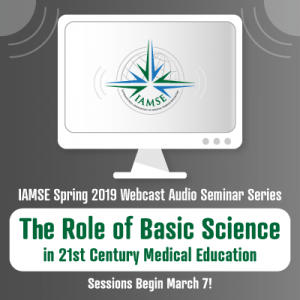
The 2019 IAMSE Spring Webcast Audio Seminar Series is right around the corner! This season will focus on the role of basic science in current medical education. How can basic science instruction continue to fulfill its mission of providing a scientific approach to the practice of medicine? The IAMSE spring series is addressing this question by presenting several new approaches to improve foundational science instruction beyond integration with the clinical sciences. This March, we’ve lined up eight speakers to shine a light on the topic across multiple landscapes in medical education. Our second session’s speakers are Drs. Brenda Roman, Mary Jo Trout

Going Lecture Free for Gen Z
Presenters: Brenda Roman, Mary Jo Trout
and Irina Overman
Session: March 14, 2019 at 12pm Eastern Time
The

We are aware that the majority of medical schools still have lectures as a significant part of their instructional hours, and believe if USMLE scores for a medical school are fine, “why take a risk in changing the curriculum?” Faculty may fear that active learning diminishes their teaching role. However, using teaching and learning strategies that are based on the science of learning, especially retrieval-based practice, actually requires faculty to do a great deal more than “cover the content”. Faculty

We utilize active learning strategies of team-based learning, peer instruction, case-based learning, and problem-based learning, in which students are only in the classroom about 3 hours/day during the Foundations Phase, allowing ample time for self-study and advanced preparation. Since Peer Instruction is being utilized in over 60% of our curricular time, we will spend more time discussing Peer Instruction, from the faculty perspective in developing session material and how to effectively facilitate sessions, and from the student perspective in how learning gains are made in the sessions.
At the end of the session, participants will be able to:
- Explain the evidence and rationale for using active learning strategies throughout medical school, and how active learning strategies contribute to student attendance and team-work.
- Formulate effective approaches to implementing a lecture-free curriculum that is grounded in science, specifically using the teaching modality of Peer Instruction (PI).
- Introduce best-practice strategies, tips, and lessons learned from going lecture-free.”